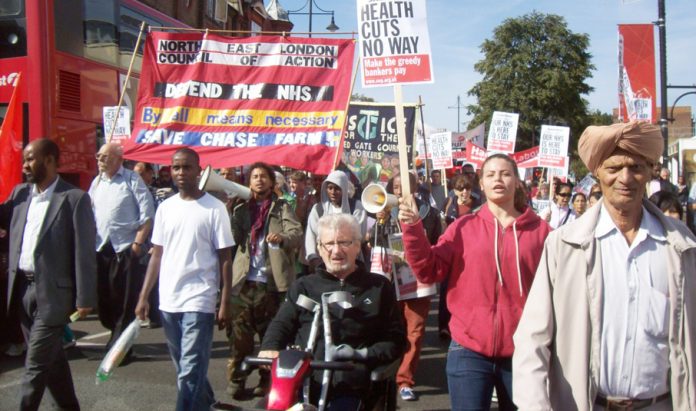
THE NHS is sitting on £4 billion of reserve cash whilst unprecedented government cuts of £20bn have doubled the number of hospitals falling into financial crisis, an Audit Commission report on the NHS financial year has revealed.
Hospitals are being put into administration and privatised whilst the NHS has money to burn.
31 trusts posted a deficit in 2011/12 compared with 13 the previous year. That is more than one in 10 of the total.
The majority of deficits are in the South East and London.
Professor John Appleby, chief economist at the King’s Fund, said: ‘It seems like the squeeze is tipping trusts over into deficit. The chances are this will get worse in the coming years.’
Whilst revealing that the NHS has built up cash reserves of almost £4bn even as rationing has increased, and the number of nurses has fallen and the service has had to make unprecedented savings, the Audit Commission makes the astonishing claim that, ‘These savings did not materially affect the total number of frontline staff and do not appear to have resulted in any major transformation to the way care was delivered.’
The number of staff employed by NHS bodies fell by 9,407 (0.9%) in the year to April 2012.
The trust with the highest deficit was South London Healthcare, which posted a £65.1m deficit. It has been put into administration because of its long-standing problems.
Yet primary care trusts (PCTs), strategic health authorities and hospital trusts between them did not spend £1.6bn from their budgets in 2011-12, with semi-independent foundation trust hospitals underspending by a further £400m, according to the report.
Another £1.5bn from PCTs cutting 2% of their budgets made the overall surplus nearly £4bn. This sum is being called ‘uncommitted finances providing financial room for manoeuvre in the future’ according to Andy McKeon, the Audit Commission’s managing director of health.
Commenting on the report, Christina McAnea, Unison head of health, said: ‘Many trusts face a toxic cocktail of PFI debt, the wasteful cost of the Tory NHS restructure, and demands for so-called efficiency savings.
‘It is a tragedy that £4bn is sitting in the bank when struggling hospitals are rationing patient care, closing wards, and nurses are losing their jobs. This would not happen if hospitals were directly run by the NHS – money could then be moved to where it is needed most, balancing the books and safeguarding patient care.’
Peter Carter, for the RCN, said: ‘The NHS is tasked with saving £20 billion in England alone, and NHS hospitals and organisations are dealing with this reality on a daily basis.
‘Patients will question why as many as 61,000 posts are at risk in the NHS when there is an overall surplus of £1.6 billion.
‘To date, we have not seen evidence that this surplus is being reinvested into patient care, and a rigorous analysis of NHS finances is now needed.
‘Trusts need to focus on keeping patients healthy. Nurses, like patients, will be anxious to avoid a situation where trusts run up enormous deficits which then lead to a crisis in patient care.’
Unite’s head of health, Rachael Maskell, said: ‘We now know why the risk register into the coalition’s so-called NHS reforms never saw the light of day, despite the best efforts of the Information Commissioner, Christopher Graham.
‘The financial risks of Cameron’s reforms have resulted in trusts rapidly sinking into debt, leaving them ripe for accelerated privatisation.’